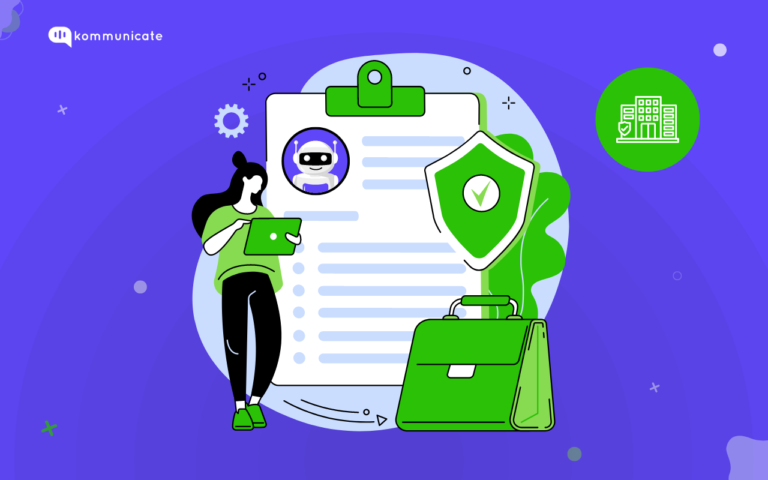Updated on February 3, 2023
Did you know? At least one-quarter of travel and hospitality businesses are now using chatbots in their daily operations (Statista). From addressing general inquiries to confirming instant bookings, chatbots can automate a lot of manual tasks that otherwise require human intervention.
That’s exactly what millennial customers want as well. At least 70% of customers now expect a company’s website to include a self-service application (Source: The Self Service Economy). Chatbots fit into the equation perfectly by enabling your customers to find information and support on their own without relying on the business website or a human agent.
For the business, this means saving an incredible amount of money that would otherwise be spent on customer service. IBM’s study found that the average cost per customer service interaction over the phone ranges from USD 5 to USD 12. Virtual agents bring this cost down 80% to USD 1.55 per interaction. Virtual agents, right now, are best represented by chatbots.
Research conducted by Expedia shows that people visit 38 websites on an average while planning their getaways.
Now, you might wonder — what does a chatbot have to do with travelling and hospitality? Turns out, it is travel and hospitality where chatbots have the best potential to unleash their cognitive capabilities. Although the pandemic has slowed down international movements, travel volumes are still transacted in staggering volumes.
Also, there is an equally high volume of customer queries, the majority of which are basic in nature and do not require the time and attention of a human agent. These two factors are sufficient enough to make chatbots an excellent fit for the travel and hospitality industry.
Of course, there are several other reasons why it is worthwhile having chatbots for your travel business. The benefits accrue for both the business and customers who are travellers.
- They deliver a friction-free customer experience
- They can drive personalization & engagement
- They mine accurate customer data at scale
- They save customer support overheads
- They deliver a friction-free customer experience
Travel businesses like tour operators and travellers — both sides of the question face a long list of challenges that makes lives difficult. Trout operators are swarmed by the volume of transactions and the need to drive personalization for each one of them.
Travellers, on the other hand, need on-the-ground assistance on a real-time basis. They need directions to reach the hotel, clarifications on the hotel stay amenities, changes in flight bookings, alterations to itinerary, and whatnot.
Handling all these operations on a manual basis calls for a dozen-strong customer support team or a call centre. It is expensive and not always productive. Chatbots on the other hand can handle these requests easily and accurately thus helping in delivering a friction-free customer experience.
- They can drive personalization & engagement
In most of their marketing and customer communication, travel businesses attempt to personalize the message. However, there are limitations to it that prevent them from providing 1:1 personalization. Further, in customer support, the need for personalization is also higher which is again hindered due to the volume of transactions.
Chatbots can act as remedies to these challenges by providing contextually relevant and hyper-personalized support to customers. They can go beyond addressing customers by the
first name and provide customer support that takes into account the real-time location of the traveller, their immediate need – change in the travel plan, booking a flight, changing a hotel room, etc. as a result, they are able to drive more customer engagement than a human agent would be able to.
- They mine accurate customer data at scale
The agent might try their best to capture the conversation as notes, however, the nuances of the conversation like the terms, phrases, and requests that the customer makes are lost forever. Guess what happens after a customer calls a call centre agent? The conversation is lost forever.
Fortunately, that is not the case with chatbots. Chatbot conversations are driven primarily in text form. The chat logs can be easily analyzed with the help of text analytics software to pick up cues like the recurring customer requests, the sentiment of the customer like angry, frustrated, tensed, relaxed, satisfied, etc. All this can help in refining further customer support offerings of the travel business.
- They save customer support overheads
As mentioned earlier, setting up a call centre and customer support team is resource-intensive. Second, it demands heavy capital investment to procure hardware and also to recruit reps to handle customer conversations. Not to miss mentioning the need for regular maintenance and upkeep of IT hardware used in customer support. All this adds to a significant sum of overheads that could otherwise be used for other productive purposes.
With chatbots, there is no need for dedicated IT hardware. Chatbots take the form of software that can run on any device and platform. Also, apart from software upgrades, they do not demand any other maintenance activities which reduce overheads. All said, they save a significant amount of customer support overheads.
Let’s take a look at how chatbots are becoming a silent force in travel and hospitality which moves at a rapid pace at all times.
Chatbot in travel for itinerary planning
Travel agents and tour operators have become almost extinct. The existing ones have changed business models to accommodate a highly personalized tour offering that is not the choice of the masses. Incidentally, it is digital technologies like chatbots that have made travel itinerary planning easier and simpler.
So, how exactly do chatbots make travel planning easier? To begin with, chatbots can create itineraries based on the duration of travel. For example, if your customer wants to see the best of New York in a day, the chatbot can create a trip itinerary based on top attractions, possible journey routes, transportation, entry times, closing times, and so on. The transport details are planned and provided based on dynamic information available on the internet.
Chatbots in travel for on-demand booking
In the past, booking a flight ticket, a hotel room, or even a cab required the customer to be physically present at the service provider’s doorstep. It was a cumbersome process and was also subject to unexpected cancellations. In short, planning and completing a trip successfully was a risky affair subject to so many uncertainties.
With chatbots, customers are no longer at the mercy of any tour operator or external agency for bookings. They can plan an entire itinerary from their doorsteps to the dream destination and back home with the help of a chatbot. By entering the name of the destination, desired flight timings, and transport reference, one can easily have all travel planning done without having to step out from the home.
Chatbot in travel as tour guides
One of the challenges that every traveler faces in a new city is finding the right direction. Your customer could be a tech-savvy person who knows how to use GPS navigation apps. However, there could be instances when things go awry making things difficult for them. Also, it is extremely difficult for travelers to find the best local attractions and services at nominal rates without local support.
Chatbots can take the role of tour guides who know them inside out of a city based on reviews and recommendations of local guides. Marsbot from Foursquare and Assist are two such great examples. They are digital friends of travelers who want to experience a new city on their own like a local. Your customers will thank you for giving on-the-ground support even if you’re not around in person to show them the way around.
Chatbot in travel for customer service
For travel aggregators and end-users alike, the biggest use case of chatbots has and will always be customer service. In the travel industry, customer service would remain the forte of chatbots. Albeit, in a different way. Chatbots would be able to provide assistance to users in a different way, like virtual assistants that can provide support for on-the-ground travellers.
For example, a customer who is running for a flight can take the help of a chatbot to quickly cancel the flight and book an alternate flight for a later time. Similarly, they can take the chatbot’s help to make changes to hotel bookings, cab bookings, without having to call or connect with the service provider in person.
With a few taps on the bot’s options, a traveller can easily make bookings, change booking dates, and also make changes to the travel schedule effortlessly.
Bon Voyage with chatbots
Almost every application that we regularly use today comes with a dose of Artificial Intelligence. It is not surprising to know that at least 9 out of 10 businesses are planning to have investments in AI or already have earmarked investments.
Chatbots are the most common form of Artificial Intelligence. They are all around us now and continue to grow in capabilities with every passing day. They can help businesses deliver value to customers with better service suggestions and self-service options.
How are you planning to use chatbots in your travel business?
Need help with doing the same? Talk to our experts.
AtAt Kommunicate, we are envisioning a world-beating customer support solution to empower the new era of customer support. We would love to have you on board to have a first-hand experience of Kommunicate. You can signup here and start delighting your customers right away.







